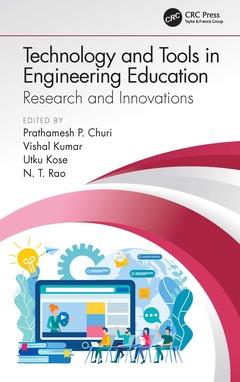Technology and Tools in Engineering Education Research and Innovations
Coordonnateurs : Churi Prathamesh P., Kumar Vishal, Kose Utku, Rao N. T.

This book explores the innovative and research methods of the teaching-learning process in Engineering field. It focuses on the use of technology in the field of education. It also provides a platform to academicians and educationalists to share their ideas and best practices.
The book includes specific pedagogy used in engineering education. It offers case studies and classroom practices which also include those used in distance mode and during the COVID-19 pandemic. It provides comparisons of national and international accreditation bodies, directions on cost-effective technology, and it discusses advanced technologies such as VR and augmented reality used in education.
This book is intended for research scholars who are pursuing their masters and doctoral studies in the engineering education field as well as teachers who teach undergraduate and postgraduate courses to engineering students.
1.Virtual Experimentation: An Advanced Tool for Educational Technology. 2. Classroom Practices: Issues, Challenges and Solutions. 3. Leveraging Information and Communication Technology for Higher Education amidst the COVID-19 Pandemic. 4. Investigating Academic Transition during the DOVID-19 Pandemic: The Case of an Indian Private University 5. Adaptability of Computer-Based Assessment Among Engineering Students at Higher Educational Institutions. 6. Integration of Digital Technologies for Constructing Influential Learning during the COVID-19. 7. Applications of ICT: Pathway to Outcome-Based Education in Engineering and Technology Curriculum. 8. Academic Workers' Behaviors Toward Scientific Crowdsourcing: A Systematic Literature Review. 9. Tools and Technology Assisting Accredation in Engineering Education. 10. 4QS Predictive Model Based on Machine Learning for Continuous Student Learning Assessment.
Prathamesh P. Churi (SMIEEE, MACM, LMCSI, LMISTE, MIGIP) is faculty member in Computer Engineering Department in School of Technology Management and Engineering, NMIMS University. India. He is Senior Member of IEEE. Currently. He is Serving as Associate editor of International Journal of Advances in Intelligent Informatics (Scopus Q4-Artificial Intelligence) and International Journal of Innovative Teaching and Learning in Higher Education. He is also the research mentor in Cerebranium. He is actively involved in peer review process of reputed IEEE and Springer journals such as IEEE Transactions on Education, Springer Education and Information Technologies and 17 other journals. He has 50+ research papers in National/International Conferences and Journals (Scopus, ESCI and SCI Indexed). He has 4 (Including 1 Australian patent) patents in the field of Wireless Sensor Networks, Machine Learning and Internet of Things. He has edited 3 international books (CRC Press Taylor and Francis publications) in the field of Data Privacy and Education Technology. He has been a keynote speaker, chair, convener in the international conferences including the flagship conferences like IEEE TALE 2017-2020, Springer ICACDS etc. He recently received "Best Young Researcher award" by GISR Foundation for his research contribution in the field of Data Privacy and Security, Education Technology. He has also got appreciation award for best faculty from NMIMS University. He is active leader, coach, mentor, volunteer in many non-profit organizations. He is also involved as board of study member in many universities for curriculum development and educational transformations.
Recognizing his passion for research and teaching at a young age, he started teaching to engineering students in core computer science branch right from the age of 23. He started his journey as a professor and researcher and has been working successfully in this field since past 4 years. His relaxati
Date de parution : 10-2021
15.6x23.4 cm
Thèmes de Technology and Tools in Engineering Education :
Mots-clés :
MOOC; E-Learning; Education System; Distance Learning; Online Learning; Sustainable Teaching; Google Classroom; Smart Learning; Corona Virus; Smart Phones; Massive Open Online Course; Virtual Laboratory Experiment; 4QS Model; Engineering Education; Outcome; Based Education; AICTE; Virtual Laboratory; ICT Incorporation; Customizable ERP System; International Engineering Alliance; Crowdsourcing Platforms; ICT Tool; PRISMA Flow Diagram; FINHEEC; CMT; Computer System Usability Questionnaire; Server Side Coding; Active Learning Pedagogies; Sq; ICT Integration



